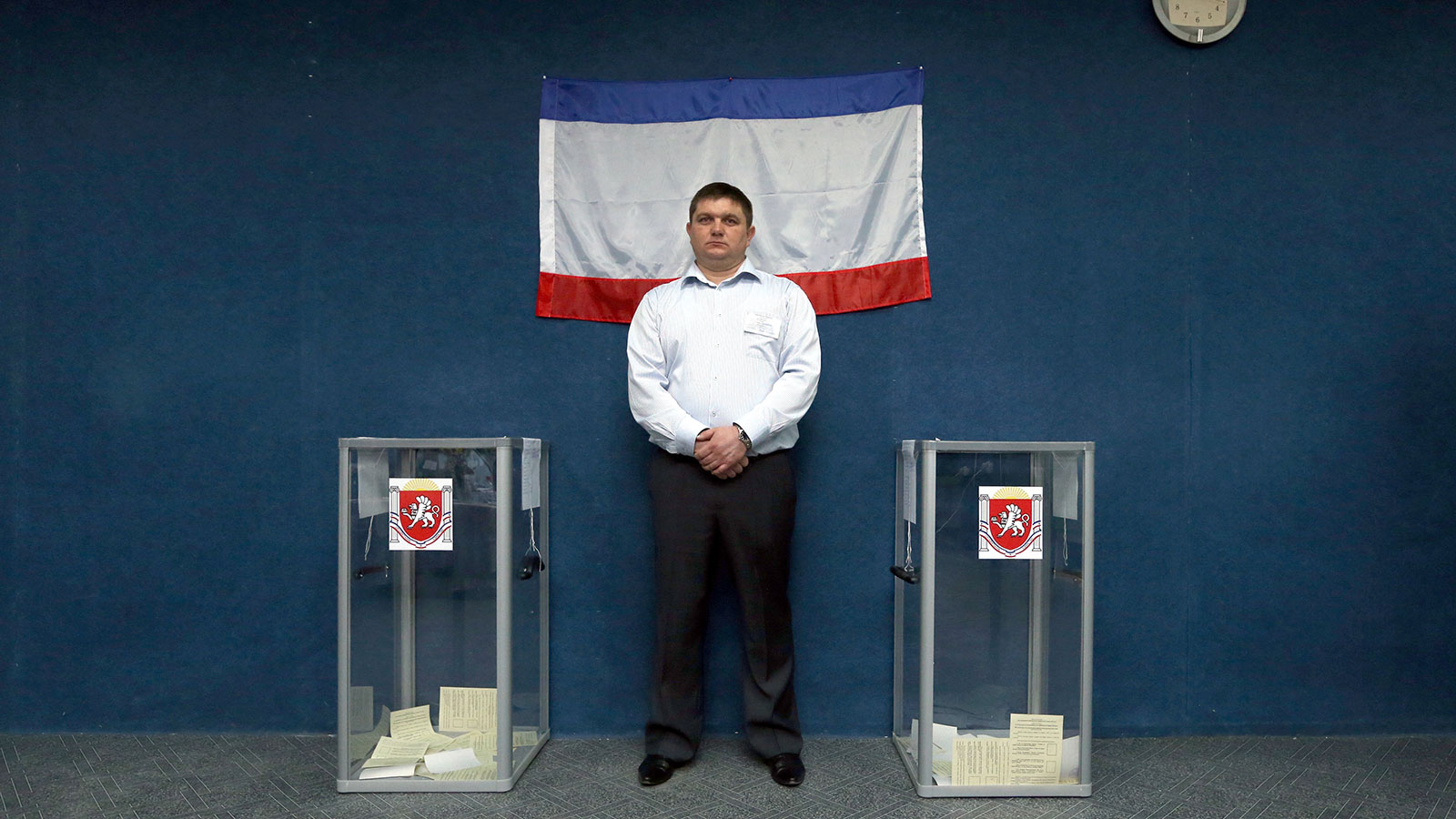Whose statue will stand in Kyiv in 50 years?
The odds are against Putin, writes Paul Wells
Sergei Karpukhin/Reuters
Share

Just because Vladimir Putin made the first move in Ukraine doesn’t mean he must ultimately win. If you look only inside Ukraine, the Russian president’s early action has given him a tremendous advantage. He moved in Russian troops, activated local militia in Crimea, organized a referendum, declared victory and signed the region’s annexation without firing a shot. (The gunfire did start immediately afterward, with at least one killed at a Crimean military base in Simferopol. As I wrote this it was too early to know what would happen next.)
But broaden the field of view a bit and you see trouble for Putin in his moment of apparent triumph. In Moscow, 50,000 people marched to protest against Putin’s interference in Ukraine. At his peak of personal popularity, during a wave of jingoistic pride among Russians who were tired of watching their empire shrink, a huge crowd of Muscovites had the courage to speak against Putin. Around the edge of Europe, other countries are drawing their conclusions from what has happened in Ukraine. Sweden and Finland, which had resisted NATO membership for decades, are now considering it. They note that Russia moves much more boldly against countries that aren’t members of the alliance. They are drawing logical conclusions.
Some people wish NATO had not expanded even as far as it already has, because it leaves Putin feeling cramped and snarly. But it is not as though the only votes in the matter belonged to the Russian and American presidents. The populations of Europe get a say, too. Overwhelmingly, they have supported NATO membership. Outside the presidential palace in Warsaw, three flags have flown for a decade: Poland’s, the European Union’s and NATO’s. Holding, and exercising, the right to choose its own alliances is a prerogative Poland holds dear. All the more so because Poland spent most of the 20th century watching others choose for it, often at costs we can hardly imagine. It’s a similar story across the region.
It would be good if more Western leaders had a better understanding of the regions Putin fears he has lost—the countries of the former Warsaw Pact. Angela Merkel does, having grown up in the former Communist East Germany. The other G7 leaders who will meet at The Hague to plan strategy after Crimea’s annexation have remarkably limited personal experience in the region. Barack Obama’s example is stark. Bill Clinton visited central and eastern Europe 19 times as president, George W. Bush 20 times. So far Obama has made three such trips, twice to Prague and once to Warsaw. He often sent Hillary Clinton, when she was on the payroll. He sent Joe Biden immediately after the Crimea referendum. Allies notice when you don’t show up yourself. Especially if your predecessors used to.
This year marks the 25th anniversary of the revolutions that toppled dictatorships from Warsaw to Budapest to Prague and beyond. The near-bloodless end of the Cold War was one of the great miracles of peace in a century that had known too many nightmares of war. Europe’s new democracies are transforming the continent as their populations rise from poverty and their governments grow in confidence. These nations remember who their friends were. There is a monument to Charles de Gaulle in Warsaw because he served as an infantry instructor during the Polish-Soviet War in 1919-20. There is a monument to Ronald Reagan because he told Mikhail Gorbachev to tear down the Berlin Wall. There’s a Wilson Square, named for the president who formulated rough theories of national sovereignty. There is no statue to Winston Churchill. He is a hero in much of the world. Not here.
Whose statue will stand in Kyiv in 50 years? Perhaps Putin would like it to be his. The odds are against him, because the tide of history is against him. He had been a KGB station chief in Leningrad for 16 years when it became St. Petersburg again in 1991. Everything suggests he misses the way it used to be. Tens of millions know the future looks more like the countries to Ukraine’s west than the country to its east.
So far the West has done too little to deserve their confidence. Germany runs on Russian gas. London runs on Russian billionaires. Paris is eager to sell helicopter gunships to Moscow. While Ukrainian soldiers sat surrounded and outnumbered in Crimea, Eurocrats were busy cutting Russian names from their sanction lists. Mustn’t ruffle feathers.
I don’t know what will happen in Crimea, whose history is long and largely Russian. But for almost all of Ukraine, the future is in the European Union and NATO. This will happen sooner than the West may even want, because it’s what the people want. Putin can’t stop what’s coming. When they are finally making their own choices and enjoying the prosperity that comes with that freedom, Ukrainians will look west, and remind themselves who their real friends were. If there were any.